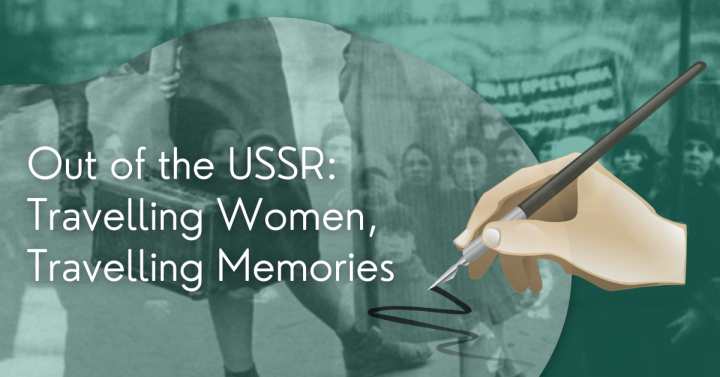Out of the USSR: Travelling Women, Travelling Memories
2nd – 3rd February 2023, Out of the USSR: Travelling Women, Travelling Memories – CALL FOR PAPERS!
University of Turku, organised by the research project Texts on the Move: Reception of Women’s Writing in Finland and Russia 1840–2020 (Emil Aaltonen Foundation)
Travelling has always been connected with fundamental social and political changes taking place in societies. Throughout history, one of the countries that people have chosen to leave, move away or have been expelled from, but also a country which they have been going back to, is Russia/the Soviet Union. There is an obvious link between the large transformations that have taken place in Russia since the time of perestroika in the 1990s until the ongoing war in Ukraine and the restrictions of civil rights such as freedom of speech, and the increased mobility out of Russia.
The conference takes these transformations as starting points in examining how individuals reflect on and recall the Soviet/Russian home country in literary presentations, addressing the history of mobility, emigration, family, gender, ethnic or religious background in face of their collective memory in their new place of residence. The meeting points for the proposals are the concepts of travelling/mobility/exile and (post-, trans-/cross-cultural) memory. The focus is on women’s fictional texts and memories from the 1980s until today that allow the presentations to address and to acknowledge [e]migrating women writers as mediators of ideas and memories in trans-/cross- cultural contexts. The aim of the conference is to focus on gender in the process of the transformation of cultures through ideas that travel, and to pay special attention to women’s contribution to the cultural transfer and mobility of ideas and memories which have not been sufficiently studied and documented.

We expect presentations addressing published fictional texts by women who have moved from the Soviet and Russian territories into new areas, and by writing they have created and processed memories of moving and of resettling in a new country/location of residence. We are especially interested in memories of women emigrants and travellers to the Nordic countries, Germany, Great Britain, the US, France and Israel.
The conference has its background in the research project Texts on the Move , and it is organised by Texts on the Move: Reception of Women’s Writing in Finland and Russia 1840–2020 (Emil Aaltonen Foundation), University of Turku, and Tampere University.
Keynote speakers are:
Eva Hausbacher, Professor of Slavic Literature und Culture at the University of Salzburg, Department of Slavic Studies. “Close distances: Narratives of the Soviet Past in Russian-German Women’s Writings”
Simona Mitroiu, PhD, Senior Researcher at Alexandru Ioan Cuza University, Department of Interdisciplinary Research in Social-Human Sciencesm“Generations of Memory in Women’s Narratives: Literary (re)workings of Transnational Disruptions, Intersections, and Transformations”
- Please send your abstract (title, ca. 250 words, names and affiliations of the presenters) by 20 November 2022 to Viola Parente-Čapková (viocap@utu.fi) and Arja Rosenholm (arja.rosenholm@tuni.fi).
We invite researchers to a two-day conference that provides a platform to reflect upon the themes that address the following issues and more:
● What is recalled, and how the history of leaving/migration is experienced, recalled and narrated?
● Ideas, ideologies and memories (e.g. national myths) which women carry along to their new country/location of residence, and how they change in regard to the home country vis-à-vis the new country?
● The creation and production of post-memorial recollection of family history
● Motives for leaving and emigration
● The constitution of matrilinear narratives and transformation of individual, family- and collective memory through travelling
● Carriers, media, contents, practices and forms of travelling memory
● Recollection of Soviet terror (e.g. Stalinist genocide and Holodomor) in the face of the prevalence of Holocaust memory in the new site of residence
● The understanding of one’s “own” culture, its possible changes, and the kind of presentation / narrative forms the change of location / culture /context produces
● Narratives of lived experiences in the new location
● The form that the social and cultural background (age, profession, gender identity, family background, etc.) takes in the texts
● Cultural memories (family, generation, gendered, etc.) that are carried along and created in the new country of residence, and what is their relation to the new location of residence?
● Narration of the journey, departure and arrival at the new location of residence
● Sites of memory in transition
